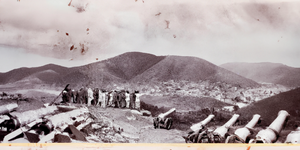Siege of Middleborough: Difference between revisions
No edit summary |
No edit summary |
||
| Line 6: | Line 6: | ||
| image_size = 300px | | image_size = 300px | ||
| alt = | | alt = | ||
| caption = | | caption = Officers inspecting cannons and trenches on the outskirts of Eastborough | ||
| date = 24 May 1873 – 15 February 1875 | | date = 24 May 1873 – 15 February 1875 | ||
| place = [[Middleborough, The Furbish Islands|Middleborough]], [[Interior Tasmana]], [[The Furbish Islands]] and surrounding towns | | place = [[Middleborough, The Furbish Islands|Middleborough]], [[Interior Tasmana]], [[The Furbish Islands]] and surrounding towns | ||
Revision as of 15:56, 16 February 2023
This article is incomplete because it is pending further input from participants, or it is a work-in-progress by one author. Please comment on this article's talk page to share your input, comments and questions. Note: To contribute to this article, you may need to seek help from the author(s) of this page. |
The Siege of Middleborough was the last engagement of the Tasmana Mountain Campaign and Tasmana War. It began in XXX when anti-government forces under Machiel Zonnenberg surrounded pro-government forces under XXX in Middleborough and some surrounding towns, and ended with XXX's surrender in XXX. The siege was the longest engagement in the Tasmana War.
By summer 1874 pro-government forces were pushed back to the Tasmana Mountans, which began the bloody Tasmana Mountain Campaign. By the end of summer, they were pushed back to only a handful of holdouts including Middleborough. Anti-government forces attacked the holdout in all directions in XXX but were pushed back. Under direct command of Zonnenberg, they surrounded Middleborough and began a trench warfare campaign. In a week, pro-government forces in Westborough defected, allowing anti-government forces to capture the city. A second hastily planned assault was launched the same day and soldiers gained some ground, especially around Westborough, but were stopped.
The third assault was launched one month later when reinforcements arrived. It captured parts of Eastborough and other towns, but failed to capture many of its targets and saw heavy casualties. One month later when forces recovered, the fourth assault was launched which captured most of Eastborough but with heavier casualties. The fifth assault was launched in XXX before the winter set in but was pushed back. In early 1875 the sixth assault was launched, which broke through defenses in Middleborough. Heavy fighting continued for the next two days until pro-government forces announced a surrender. As Middleborough contained the last holdout of pro-government forces, its surrender marked the end of the Tasmana War.
The siege was the longest engagement in the Tasmana War. The cities of Eastborough and Middleborough were destroyed almost completely, being more damaged than Harrisbarig or Noorderstein, and never regained their prominence for decades. Westborough, which surrendered early on, was spared much of the damage. The siege also saw the use of trench warfare and modern weapons, foreshadowing their use in the First Great War.
Background
Opposing forces
Anti-government
General staff: Anti-government forces were under command of Machiel Zonnenberg. He moved his headquarters to XXX.
Third Army: The Third Army initially surrounded pro-government forces in Middleborough.
- Commander: NAME
- Chief of staff: NAME
- Commander of artillery: NAME
- Adjutant: NAME
- Quartermaster: NAME
| Corps | Divisions | Brigades | Regiments |
|---|---|---|---|
| I Corps | First Division | First Brigade |
|
| First Brigade |
| ||
| Second Division | Second Brigade |
| |
| First Brigade |
|
First Army: The First Army was sent in XXX to reinforce the Third Army.

